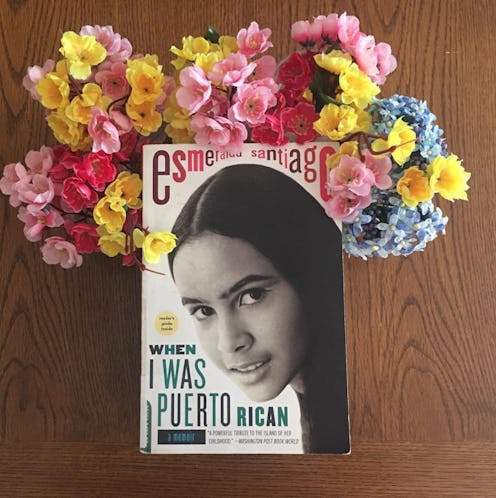Books
LatinxReads Is A Gorgeous Tribute To Latinx Authors
The importance of diversity in literature has long been a topic of discussion among the bookish community. Campaigns like We Need Diverse Books and Reading Without Walls have helped immensely in their campaign to bring of representation to the forefront and celebrate of authors and stories from all around the world. But there is still something uniquely empowering about seeing a reader create her own movement, especially through something as simple and ubiquitous as social media. That's what Sabrina Rodriguez is doing with her Instagram account LatinxReads, a scrollable treasury of Own Voices books. The vibrant floral photos highlight books written by Latinx authors and about Latinx people.
"After taking my first Latino Studies class in college, I realized how disconnected I was from my Latino heritage," Sabrina Rodriguez tells Bustle. "I was one of those kids who didn’t grow up speaking Spanish and I didn’t know what it meant to be Latino. The first thing I turned to was books and literature. I have always been an avid reader, and reading is a way to really immerse yourself in the world of someone else. I created the Instagram for people, like me, who aren’t immigrants, who might not have grown up speaking Spanish, or who may not even have parents who are immigrants. The people who feel disconnected from their Latino heritage and are confused as to where they fit in the Latino community."
Many Latinx adults grew up without reading many — or any — Latinx stories. This can have long-term negative affects on how people perceive themselves and their place in society.
"Because I'm white-passing, I never really regarded whether I was being represented in the books I read because I often had comparable features to those in the books," Rodriguez says. "But as I entered high school and began reading the so-called 'Classic' books, it clicked that something wasn't right."
She says, "I've gained a lot of hope now because of how many books I've found that are written by [and] about Latinxs, but even that has its limitations. There are so many books written about Mexicans, Dominicans, Puerto Ricans, and Cubans; mainly because those are the most common nationalities you can find in the U.S. It's something we still need to make progress in."
So, what does Rodriguez hope will change when it comes to publishing Latinx authors? First, she says publishing needs to move away from boxing Latinx stories into only one category: immigration. While it is undeniable that the immigrant narrative is a huge part of the identity of many Latinx people, it does not tell the whole story.
"Our stories are not just about immigrating to the U.S. for a better life, living in poverty in the U.S., and facing discrimination and racism in the U.S. Though these are all important and very real aspects of being Latinx, having a story that debunks popular stereotypes about Latinos is just as important. We can be rich, gay, trans, blonde-haired and blue-eyed, fat, skinny. Latinx literature is about telling the stories of each and every one of these people," she says.
Beyond that, Rodriguez says that changes need to be made in classrooms, and diverse literature needs to be added to curriculums across the country. "I never read a book written by an Asian or Latino author in high school," she says. "Primary and secondary education is where students begin to find themselves. Seeing themselves in books is an important part of this process, and that's something that I think I would like to change the most."
Though Rodriguez has created one of the most exhaustive databases of Latinx literature on the internet, she still struggles to find books that celebrate all the cultures that exist under the Latinx umbrella. She often asks for recommendations from her followers for books from less represented countries in South and Central America, because, of course, she knows how important it is to create an account that is as diverse as Latinx themselves.
"To people who aren't Latinx, they don't recognize the difference between reading about someone who is from Uruguay or Paraguay: they sound the same right? Aren't they close to each other? They both speak Spanish? Yeah, they're pretty much the same thing then," Rodriguez says. "Little do they know [that] there is actually a difference! [I want to] encourage authors to make these distinctions, encourage publishers to market them accordingly, and encourage readers to use literature as a tool for education as well as for leisure."
And her followers are not the only ones who have gotten great recommendations and experiences from the account. Rodriguez herself has learned a lot about Latinx authors from the people who like her photos.
"It has been super positive all around. My favorite moment was when I posted How to Be a Chicana Role Model by the late Michele Serros. I hadn't known about Serros prior to learning about [her book], but I received so many beautiful comments from people exchanging their experiences reading her work and the positive impact she made on their lives. Seeing how these books and authors bring people together is what has motivated me to continue on with the Instagram."
Let's hope she keeps going for a long time to come.
